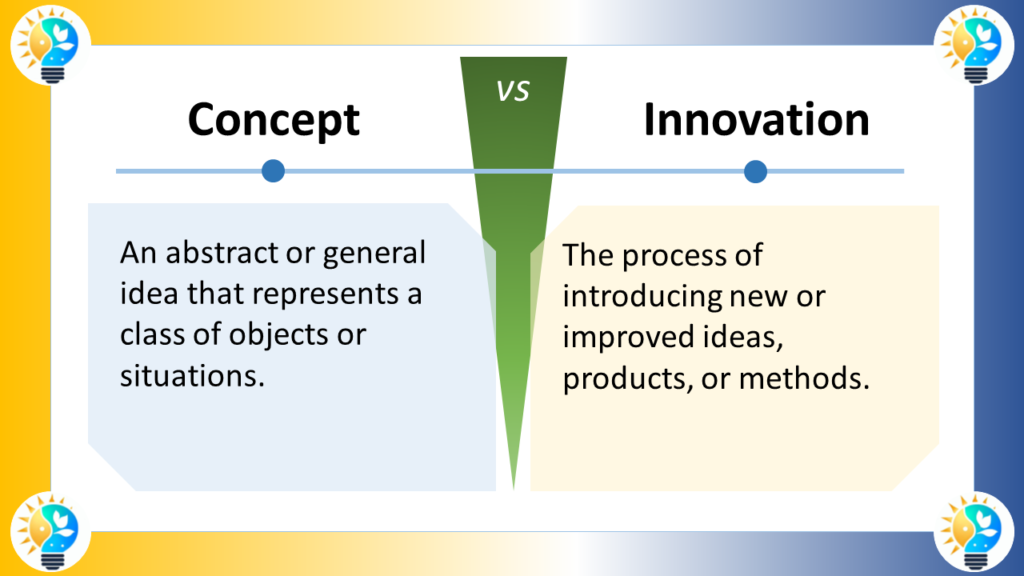The difference between innovation and concept lies in their stage of development and application.
A concept is an abstract idea or a general notion that often serves as the blueprint for further development.
Innovation involves the actual application and successful implementation of these concepts, resulting in new or improved products, services, or processes that bring about significant change.

Definition
Innovation
Innovation is the practical execution and successful application of ideas, turning them into new or improved solutions that have a measurable impact.
- Characteristics of Innovation:
- Implementation: Moves beyond the idea stage to actual creation and application.
- Value Addition: Results in enhancements or entirely new offerings that provide superior solutions.
- Market Impact: Often leads to changes in consumer behavior, industry standards, or economic shifts.
Concept
Concept refers to an early-stage idea that outlines the basic functionalities, design, or theory of a potential product, service, or system but has not yet been fully developed or tested.
- Characteristics of a Concept:
- Abstract: More theoretical and not yet fully realized or tested in practical scenarios.
- Foundational: Serves as a building block or a blueprint for future development.
- Flexibility: Can be altered or adapted as more information is gathered or as development progresses.
More Synonyms on innovation, innovate and innovative
Innovation Terms

Innovation is considered as a driving force in progress.
It includes the introduction of novel ideas, methods, or products that bring positive change and advancement.
For more information about innovations, check our glossary
Relation and Relevance
Concepts are essential as they represent the initial spark of creativity and possibility from which innovations can emerge. However, without the further development and implementation that characterizes innovation, concepts alone do not result in real-world change or improvement. Innovations transform concepts into tangible outcomes that can be experienced and utilized by others.
Innovation refers to the successful implementation and commercialization of a new or improved product, service, process, or business model that creates value.
Concept, on the other hand, refers to the outcome of examining the realization of the business potential of an innovative idea. The concept design phase transforms selected ideas into well-defined plans that provide insights into how to turn an idea into scalable and pragmatic business opportunities.
In other words:
- Innovation is the end result of successfully developing and implementing a new or improved solution.
- Concept is the intermediate step of defining and planning how to realize the business potential of an innovative idea.
The concept design process is crucial as it efficiently translates initial business needs or ideas into accurate specifications for further development and delivery. Concept design follows design thinking principles to enrich the idea and define how to create value from it.
So in summary, innovation is the ultimate outcome, while concept is an important intermediate step in the innovation process that defines how to turn an innovative idea into a viable business solution.
Context for Using Each Term
- Innovation is typically discussed within the context of technology, business, and industry where practical implementation and market success are important.
- Concept is often used in design, academia, and early stages of product development where ideas are being formed and explored without immediate pressure for practical application.
Example of Utilization
In the automotive industry, the concept of electric vehicles (EVs) includes ideas about design, potential performance, and environmental benefits. The innovation occurs when these concepts are turned into commercially available electric cars that consumers can buy and use, which meet specific performance standards and contribute to reductions in carbon emissions.
In essence, while a concept provides a theoretical or initial blueprint of an idea, innovation brings this concept to life, through practical application and real-world execution, thereby creating significant value and change.
FAQ
Q1: Can a concept exist without leading to innovation?
A1: Yes, many concepts remain theoretical or are never fully developed into practical innovations.
Q2: Is innovation always based on a single concept?
A2: Not necessarily. Innovation often combines multiple concepts or builds upon existing ideas in new ways.
Q3: Which comes first, the concept or the innovation?
A3: Typically, the concept comes first as the initial idea, which may then be developed into an innovation.
Q4: Can innovation occur without a clear initial concept?
A4: While rare, some innovations can emerge through trial and error or accidental discoveries without a preconceived concept.

